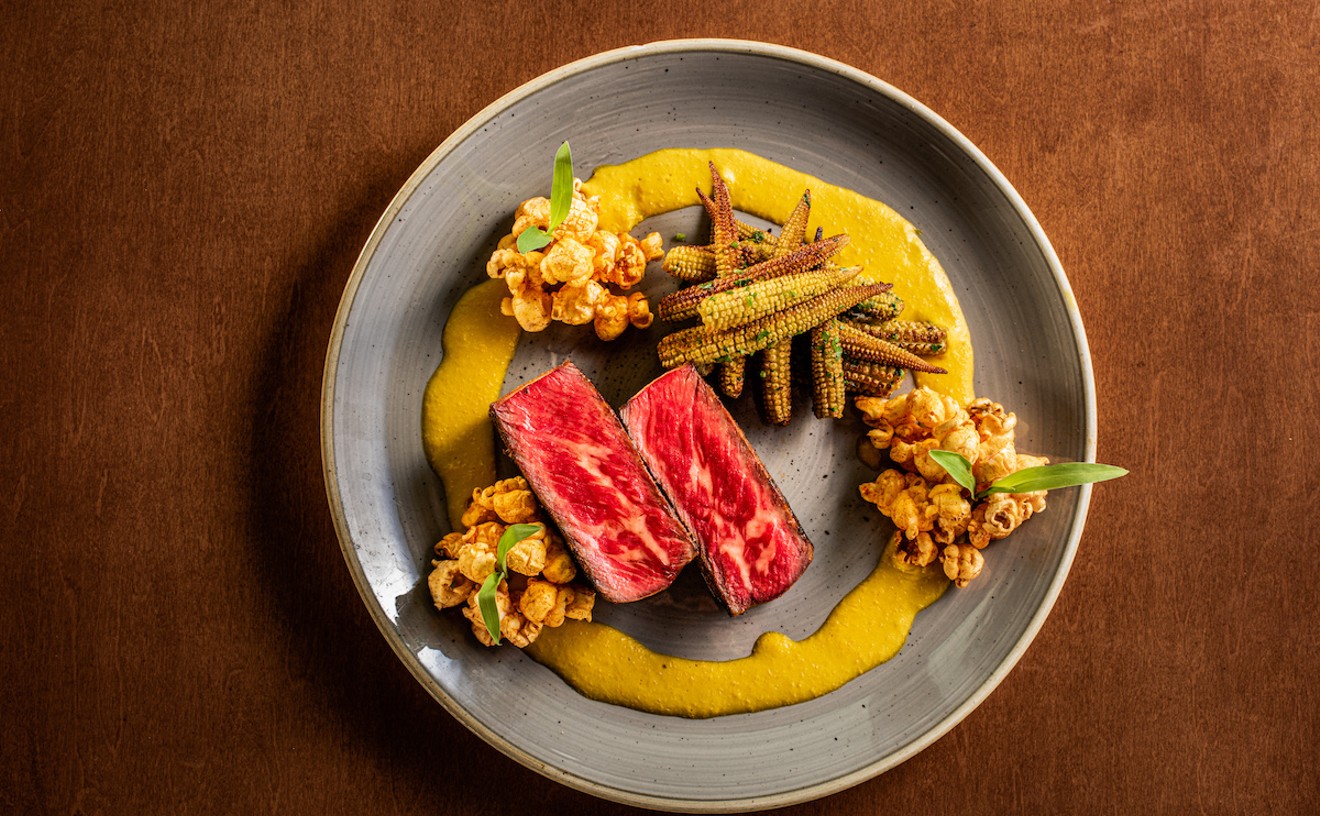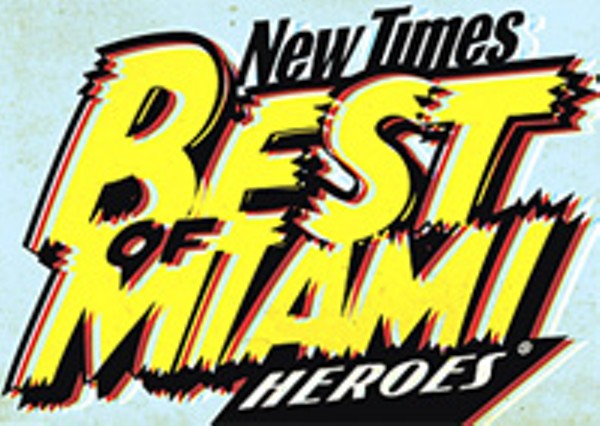Best New Law
HB 7105: Repeal of the Alcoholic Beverage Surcharge
Jeb Bush signed this baby into law on June 9, 2006, and it will take effect this July. It could generate $30 million in new economic activity in the state and potentially create 400 new jobs for Florida's considerable hospitality industry, according to a study done by the Distilled Spirits Council. Whatever. This piece of legislation means a few more pennies in the pocket of every drinker. Taxes in Florida — one of only two states that applied a per-volume tax to on-premises alcoholic beverage product sales — already make up 52 percent of the average cost of a 750-milliliter bottle of spirits.
Best One-Nighter You Missed
NRA Fundraiser

Photo courtesy of Rusty Pelican
On August 3, amid the hubbub of the Republican gubernatorial primary, the state's gun lovers converged on the Rusty Pelican. They were all present for the delightful gala event, which was held in a cheesy ballroom in the waterfront restaurant — with all proceeds going toward Boys & Girls Clubs shooting programs and "educational things" like Eddie Eagle, the lobby's giant costumed mascot, who minces around in front of elementary school children and tells them not to pick up unattended firearms. The audience at the $50-per-plate soiree comprised beefy men in full camo and Latin ladies in cocktail dresses. No one really drank much because some were packing ... and that's against the law. Failed gubernatorial candidate Tom Gallagher popped in to perform a solemn pledge of allegiance and lamented, "There just aren't too many young people today who know what it means to be an American." "I know exactly what it means to be an American," a twelve-year-old muttered while demonstrating his cool hand with a trigger-guard-mounted laser sight. He had pulled the sight (mounted on a plasticine Beretta) off of one of several raffle item tables. Also on sale were shotguns, ornate eagle-related desk pieces, and a variety of hunting knives. One stand featured a trio of pretty young blonds auctioning a revolver using a deck of cards — $10 per card. Ah, Miami....
- 3201 Rickenbacker Cswy., Key Biscayne, 33149 Map
- 305-361-3818
- therustypelican.com
Normally there's nothing Miamians hate more than taking the Metrobus anywhere — even the more loathsome act of sitting in rush hour traffic day after day seems preferable. (We're not even going to discuss that thing called "walking.") But twice a year some of these same Miamians fight over the privilege of spending their Saturday mornings crammed together riding a city bus. Since 1994 Miami-Dade Transit has offered a free black history tour that winds through the city's oldest African-American neighborhoods. You'll visit Overtown, Coconut Grove, Liberty City, Allapattah, and Brownsville while knowledgeable staff rap about people like D. A. Dorsey and E.W.F. Stirrup, and places such as the Lyric Theater and Georgette's Tea Room. Even though the tour is barely advertised, it is so popular that you have to register in December to make sure you have a seat in February. The transit department added a Hispanic Heritage version in 2000 that travels through Little Havana, downtown, and the Orange Bowl area. It features Domino Park, a cigar factory, and other Hispanic points of interest, while introducing you to Cuban celebrities and revolutionary heroes. That tour is offered in English and Spanish. Both tours are free and last three to four hours. The black history tours are in February; the Hispanic tours are in October. Early reservations are mandatory. See you on da bus.
Best Boondoggle
Train to nowhere
Okay, so it's bad enough that Miami International Airport is always under construction, and the parking situation is confusing at best and miserable at worst. But Magic City dwellers suffered one more airport-related indignity last year when it was revealed that the long-awaited airport train is $1.5 billion over budget and that its train cars are sitting empty where they were manufactured, in Japan. Yes, Japan. In April 2006 the county commission approved spending $1.98 million to "exercise" the train cars (in Japan) over the next two years. The cars can't run here in Miami because the tracks aren't ready yet. "I think some mistakes were made," John Cosper of the Miami-Dade Aviation Department told NBC News. Ya thinkç
Best Place to Hike
Fakahatchee Strand Preserve State Park
Okay, so it's in Collier County, but it's close enough (about an hour-and-a-half drive) and the drive is more than worth it. Called the "Amazon of North America," this area is unparalleled for swamp-tromping. Twenty miles long by five miles wide, it's an explosion of flora and fauna, from the wetter swamps and prairies, to the drier islands of tropical hardwood hammocks and pine rocklands where Eastern indigo snakes and Florida black bears roam. Its groves of native royal palms are the most abundant in the state. Oh yeah, it's also the orchid and bromeliad capital of the continent, with 44 native orchid species and fourteen different kinds of native bromeliads.
Best Political Coup
Alex Villalobos's Senate Win
Sometime during the 2006 legislative session, one Republican lawmaker dared to challenge Jeb Bush's crazy proposals on class size and vouchers. That man was state Sen. Alex Villalobos, and his refusal to support Bush's master plan for education cost him dearly. Punishment was swift: Villalobos was stripped of the honor of becoming Florida's first Cuban-American Senate president. Bush backed another Cuban-American to run against him (school board member Frank Bolaños, who was also endorsed by crazy drunk-dialer/state Rep. Ralph Arza). What ensued was the costliest — and meanest — state Senate race in Florida's history. Shady third-party groups spent $6 million to take down Villalobos, and at least $1 million was spent on nasty TV and radio ads in the week before the election. The campaign devolved into a theater of the absurd when Bolaños hired a man in a chicken suit to plague Villalobos at campaign events. Villalobos rolled with the joke ("A bunch of people rushed the chicken because they thought they could get Pollo Tropical coupons," he said), and his sunny nature prevailed. He squeaked by in the election. Now, some political insiders say, Villalobos is untouchable.
Best Tour Guide
Robert Burr
Robert Burr was born and raised in the county of Dade. His family came here in 1876, and traces of his ancestors' hard work can be found from Arch Creek Park to Burr's Berry Farm. As you might expect from a seventh generation member of a pioneering family, he knows the nooks and crannies of this city like the back of his hand. On any given weekend Burr is leading one of the many walking and driving tours he's created. He has introduced thousands to the pleasures of the Redland and Coral Gables through his ever-popular Redland Riot tour, as well as his Coral Gables Wine Walk, Gallery Stroll, and Pub Crawl. He's done this in person by leading the procession, although the front-and-center position isn't necessarily his favorite. "I really don't want everyone to go with me, per se. In the Gables, we're doing a wine walk tonight. And people will call and say, ÔOh no, it's already sold out.' And I'm like, ÔYou know whatç Go do a wine walk with you and your friends! I ultimately hope to set an example for how to go do this stuff yourself," explains the affable, silver-haired gent. Burr has single-handedly reinvented the concept of locals discovering Miami on their own. His comprehensive Websites offer print-it-yourself maps that highlight hidden gems in neighborhoods that people usually just drive through. The Gables tours focus on the area's rich dining and boozing prospects, and the Redland Riot Tour (and recently added Redland Riot Road Rallye) leads groups of explorers into the still-lush corners of Miami's rapidly developing back yard. Exploring the Redland is a Burr family tradition. "When I was a kid, when they said, ÔHop in the station wagon, we're going to the Redlands.' That meant we'd get to go see Uncle Charlie and pick some strawberries," Burr recalls. "One of the simple pleasures in life is to pick your own fruit. Someday it's going to be something that's just in the past, picking your own strawberries." The U-Picks are disappearing and the farmland is being converted into little boxes made of ticky-tacky that all look just the same. But thanks to the efforts of Robert Burr, urbanites seeking a weekend getaway will continue to discover the pastoral pleasures of the Robert is Here produce stand, Schnebly Winery, and historic Cauley Square, thereby preserving what's left of Miami's verdant past.
Best Political Miscalculation
Frank Bolaños's entire career in 2006
First he supported the ban of Vamos a Cuba, a 32-page children's book that Cuban exiles said glossed over the harsh realities of modern-day life on the island. The ACLU sued the district over the ban and won. Then Bolaños called for an appeal of a judge's ruling to allow the book on school library shelves, costing the district thousands and thousands of dollars. He was rewarded for this stupidity with backing from Gov. Jeb Bush in his campaign for state Senate against incumbent Republican Alex Villalobos (see above). During the campaign, Bolaños tried to use the book for political leverage among his constituents. His antics (namely a chicken suit) escalated that race into one of the nastiest, and costliest, state Senate contests in Florida history. Fortunately the voters in the district were smart and Bolaños was defeated.
Best Way To Get Fit
Everglades Snowbird Century
If you have never ridden 100 miles on a bike before, you have no idea (a) how good it feels, nor (b) how difficult it is. Nor do you realize how many billions of calories you'll burn in the process. For those who haven't, the annual Everglades Snowbird Century is a great place to begin. Scaredç Don't be: It's a ride, not a race, and if you think your legs will fail long before your resolve, sign up for the less demanding 25, 41, or 62-mile options. For a $35 registration fee — $5 of which is donated to Everglades National Park — riders travel the rural roads of Miami-Dade County from a vantage point like no other. The route is clearly marked, and every 20 miles or so, participants can stretch out and chill out at rest stops stocked with an array of water, sports drinks, fruit, and bagels. Technicians volunteered by local bike shops are but a phone call away should you experience mechanical problems, so the only thing for you to do is ride. And though you might not realize it at the time, this will probably be the most physically strenuous activity you will ever accomplish. And your ass will never have looked so good.
Best Gym
South Florida Boxing
When heading up the steep, narrow staircase to the second-floor South Florida Boxing Gym on Washington Avenue, a stale odor wafts into your nostrils. It's that unmistakable smell of sweat, which, though rank to some, is actually the first sign of a good gym. It means members are not busy admiring themselves in the mirror, or reading a gossip rag while "running" on the treadmill. It means hearts are pounding, pulses are racing, and people are working out. Since opening the gym almost nine years ago, owner Trevor Cedar has cultivated a following of men and women alike by offering a host of classes — all taught by professionals — designed to suit any age and ability, including technical boxing classes, muay thai kickboxing, and jiu-jitsu. Each participant gets to pound out aggressions on his own bag, and if that's not enough, don a mouthguard and step into the full-size boxing ring for a sparring class. If this place doesn't get you into fighting form, nothing will.





